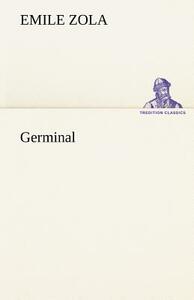Take a photo of a barcode or cover
challenging
reflective
tense
slow-paced
Plot or Character Driven:
A mix
Strong character development:
Yes
Loveable characters:
No
Diverse cast of characters:
Yes
Flaws of characters a main focus:
Complicated
Türkçesi tohum-filizlenmek demek olan Germinal bir solukta okunan, anlatımda geçen soğuğu, açlığı iliklerinizde hissettirecek kadar gerçekçi ve yaşatan bir eser. Maden işçilerinin yaşam gerçekleriyle yüzleşirken dünyanın acımasızlığı ve zorda kalınca insan sınırlarının nereye kadar gidebileceğini anlayabileceğiniz başyapıt! Maden işçilerinin yaşamında bazı şeyler modernlik adına değişse de yeraltındaki koşullarda çok da değişme yok. Derin bir eser okuyacağınız.
Okumayı bitirdikten sonra yaptığım araştırmada filminin de çekildiğini öğrendim, ilk fırsatta izleyeceğim.
Kendim için tuttuğum notlar ve alıntılarım:
#1 "Her ölüm başka ölümlere yol açar."
#2 "Gerek önderleri olma gururu, gerek düşünen tek adam oluşu, Etienne'i yavaş yavaş tiksindiği kentsoylulardan biri haline getiriyordu."
#3 "Başkalarının canını almak ya da kendi canını vermek gerektiği anda elini titretecek hiçbir şey olmayacak."
Catherine'in sabah kahvaltısını hazırlarken yokluktan kahve telvesini yeniden süzerek elde ettiği suyu kahve niyetine matarasına koyması beni çok etkilemiştir. Yine Bonnemort Baba'nın tükürdüğü kömürü hiç unutmayacağım, adam yıllarca madende çalışınca kömür tozu çiğerlerine işlemiş. Bir de küçük Alzire var, yokluğun içinde açan bembeyaz bir gül gibi mücadelesi... İyiliği... İnsanlar açlık yüzünden çığrından çıktıklarında Maigrat'ın öldüğü anda karısının verdiği tepki ve şaşkınlık örneği kendimi orada hissettirdi. Kitabın nefret ettiğim tipiyse souvarin oldu kuşkusuz. Yılan gibi sinsi kuşkucuğuluğunda giderken madenin yok oluşuna zemin olacak eylemi ile anarşi adı altında yok ettiği insanların gerçekliği yüzüme tokat gibi çarptı.
Zola farklı bir yazar. Tez vakitte hayatını gözden geçirmeli.
Okumayı bitirdikten sonra yaptığım araştırmada filminin de çekildiğini öğrendim, ilk fırsatta izleyeceğim.
Kendim için tuttuğum notlar ve alıntılarım:
#1 "Her ölüm başka ölümlere yol açar."
#2 "Gerek önderleri olma gururu, gerek düşünen tek adam oluşu, Etienne'i yavaş yavaş tiksindiği kentsoylulardan biri haline getiriyordu."
#3 "Başkalarının canını almak ya da kendi canını vermek gerektiği anda elini titretecek hiçbir şey olmayacak."
Spoiler
Catherine'in sabah kahvaltısını hazırlarken yokluktan kahve telvesini yeniden süzerek elde ettiği suyu kahve niyetine matarasına koyması beni çok etkilemiştir. Yine Bonnemort Baba'nın tükürdüğü kömürü hiç unutmayacağım, adam yıllarca madende çalışınca kömür tozu çiğerlerine işlemiş. Bir de küçük Alzire var, yokluğun içinde açan bembeyaz bir gül gibi mücadelesi... İyiliği... İnsanlar açlık yüzünden çığrından çıktıklarında Maigrat'ın öldüğü anda karısının verdiği tepki ve şaşkınlık örneği kendimi orada hissettirdi. Kitabın nefret ettiğim tipiyse souvarin oldu kuşkusuz. Yılan gibi sinsi kuşkucuğuluğunda giderken madenin yok oluşuna zemin olacak eylemi ile anarşi adı altında yok ettiği insanların gerçekliği yüzüme tokat gibi çarptı.
Zola farklı bir yazar. Tez vakitte hayatını gözden geçirmeli.
After the somewhat disappointing Nana, this was a positive surprise. Although Zola starts slow, the final two hundred pages are really gripping. But it's exactly the slow parts that made Germinal an interesting sociological read. I couldn't quite make up where Zola stands in relation to the workers: On the one hand, he clearly sympathises with their plight. On the other, people politicising the workers struggle (the anarchist Souvarine and the proto-socialist Etienne) are displayed in an unflattering light. Towards the very end, Zola seems to come out as an 'evolutionary' (revisionist) socialist. Anyway, whatever his politics, Germinal was an inspiring read. So much so I wrote a brief blog about it: https://blogs.helsinki.fi/thjelm/blog/
challenging
dark
emotional
reflective
sad
tense
slow-paced
Plot or Character Driven:
A mix
Strong character development:
Complicated
Loveable characters:
Yes
Diverse cast of characters:
No
Flaws of characters a main focus:
Yes
Germinal is an imperfect masterpiece. It was a riveting, deeply immersive read and I was very invested in the fate of the miners in spite of the fact that, on paper, it was narrative which didn't appeal to me a great deal. I understand the hype. I understand why the French revere this novel. Why it's considered Zola's best. As a sociological portrait of a community and a way of life and being few novels compare. It genuinely belongs in that superlative category with the works of the greatest social novelists - the Tolstoys, the Eliots, the Flauberts. The pervasive metaphor of the mine. This beastly, belching creature devouring human flesh - the soot, the grime, the immiseration, the deep humanity and solidarity of people bound together by shared suffering. Very few novels even come close to presenting a living nightmare in such visceral, moving terms, but this one gets there.
However, this book doesn't do what Zola intended. It's not, as he probably believed it would be, a study of hereditary characteristics within the broader Rougon-Macquart cycle. Fundamentally, it's a political novel. It's a novel about power, charismatic authority, and the bloodlust of the masses when unleashed on their oppressor. Frankly, its closest parallel may be Dostoevsky's Demons because it poses questions about where political violence comes from and its ethical justifiability. The most fully realised characters in the novel are Etienne and Souvarine - they are also its most interesting. Etienne's tragic character arc, as Rasseneur prophesises, is that of the revolutionary agitator, the man who mobilises the rage of the mob, who wins its unflinching support, but in doing so, unleashed forces he cannot muster and it turns on him and ruthlessly spits him out. It's a tragic but predictable tale - one absolutely central to the history of modern France - and it reflects Zola's own troubled and conflicted view of revolutionary violence as a means for effecting change. Souvarine is a truly fascinating and terrifying character: a dreamer and a mystic committed to realising the kingdom of heaven on earth by any means necessary. People like Souvarine don't unleash the braying hounds within a crowd. They don't seek popular acclaim. Their fanaticism and commitment to the cause. The fiery gleam in their eyes and their quiet words mirror those of a prophet. Inside people like Souvarine, slumbers an unquenchable thirst for destruction, a desire to see the world sink into a pit of hellfire and madness no matter the consequences. Perhaps few read it this way, but Souvarine is among the most important characters in this book because it's men like him who will come close to destroying the world in the century following.
What stops this book from being a novel beyond reproach is that Zola doesn't fully develop many of the characters. Too many personae are placeholders or foils, they fulfill a role but, like Catherine, Negrel or the Maheus are half realised, or like Chaval and Jeanlin are black boxes whose motives are far too simplistic or never meaningfully explained. This doesn't detract from the book too much in the way it might with some because Germinal is primarily a portrait of a society and a place, but, simply put, Zola is just no Tolstoy when it comes to creating a large palette of vivid characters.
Nonetheless, the prose in this book is beautiful and that is something Zola can never be faulted for:
However, this book doesn't do what Zola intended. It's not, as he probably believed it would be, a study of hereditary characteristics within the broader Rougon-Macquart cycle. Fundamentally, it's a political novel. It's a novel about power, charismatic authority, and the bloodlust of the masses when unleashed on their oppressor. Frankly, its closest parallel may be Dostoevsky's Demons because it poses questions about where political violence comes from and its ethical justifiability. The most fully realised characters in the novel are Etienne and Souvarine - they are also its most interesting. Etienne's tragic character arc, as Rasseneur prophesises, is that of the revolutionary agitator, the man who mobilises the rage of the mob, who wins its unflinching support, but in doing so, unleashed forces he cannot muster and it turns on him and ruthlessly spits him out. It's a tragic but predictable tale - one absolutely central to the history of modern France - and it reflects Zola's own troubled and conflicted view of revolutionary violence as a means for effecting change. Souvarine is a truly fascinating and terrifying character: a dreamer and a mystic committed to realising the kingdom of heaven on earth by any means necessary. People like Souvarine don't unleash the braying hounds within a crowd. They don't seek popular acclaim. Their fanaticism and commitment to the cause. The fiery gleam in their eyes and their quiet words mirror those of a prophet. Inside people like Souvarine, slumbers an unquenchable thirst for destruction, a desire to see the world sink into a pit of hellfire and madness no matter the consequences. Perhaps few read it this way, but Souvarine is among the most important characters in this book because it's men like him who will come close to destroying the world in the century following.
What stops this book from being a novel beyond reproach is that Zola doesn't fully develop many of the characters. Too many personae are placeholders or foils, they fulfill a role but, like Catherine, Negrel or the Maheus are half realised, or like Chaval and Jeanlin are black boxes whose motives are far too simplistic or never meaningfully explained. This doesn't detract from the book too much in the way it might with some because Germinal is primarily a portrait of a society and a place, but, simply put, Zola is just no Tolstoy when it comes to creating a large palette of vivid characters.
Nonetheless, the prose in this book is beautiful and that is something Zola can never be faulted for:
Men were springing up, a black avenging host was slowly germinating in the furrows, thrusting upward for the harvests of future ages. And very soon their germination would crack the earth asunder.
hopeful
sad
medium-paced
Plot or Character Driven:
Plot
Strong character development:
Yes
Loveable characters:
Complicated
Flaws of characters a main focus:
No
Very dark.
“Germinal” is the seventh month in the French Republican Calendar, marking both the beginning of spring and generally meaning the incipient moment of something, or the initial stage.
I read this book at my mom’s instance, and it tells the story of Etienne, a family - the Maheus- and the downfall of a mining community incited to strike by Etienne, an outsider to the town who educates himself by reading socialist texts. Zola seems to grapple with the question of whether and to what extent Etienne is to blame for the plight of the miners. They die or become crippled or become numb to pain and anything either good or bad in the world, and it may well be Etienne’s fault. The condition of the miners was awful, but at least, in the repetitious words of Bonnemort, at least “there is [was] bread.”
“Germinal” is the seventh month in the French Republican Calendar, marking both the beginning of spring and generally meaning the incipient moment of something, or the initial stage.
I read this book at my mom’s instance, and it tells the story of Etienne, a family - the Maheus- and the downfall of a mining community incited to strike by Etienne, an outsider to the town who educates himself by reading socialist texts. Zola seems to grapple with the question of whether and to what extent Etienne is to blame for the plight of the miners. They die or become crippled or become numb to pain and anything either good or bad in the world, and it may well be Etienne’s fault. The condition of the miners was awful, but at least, in the repetitious words of Bonnemort, at least “there is [was] bread.”
dark
emotional
sad
slow-paced
Plot or Character Driven:
Plot
Strong character development:
Yes
Loveable characters:
Complicated
Diverse cast of characters:
Yes
Flaws of characters a main focus:
Complicated
Jamais vous ne serez dignes du bonheur, tant que vous aurez quelque chose à vous, et que votre haine des bourgeois viendra uniquement de votre besoin enragé d'être des bourgeois à leur place.


